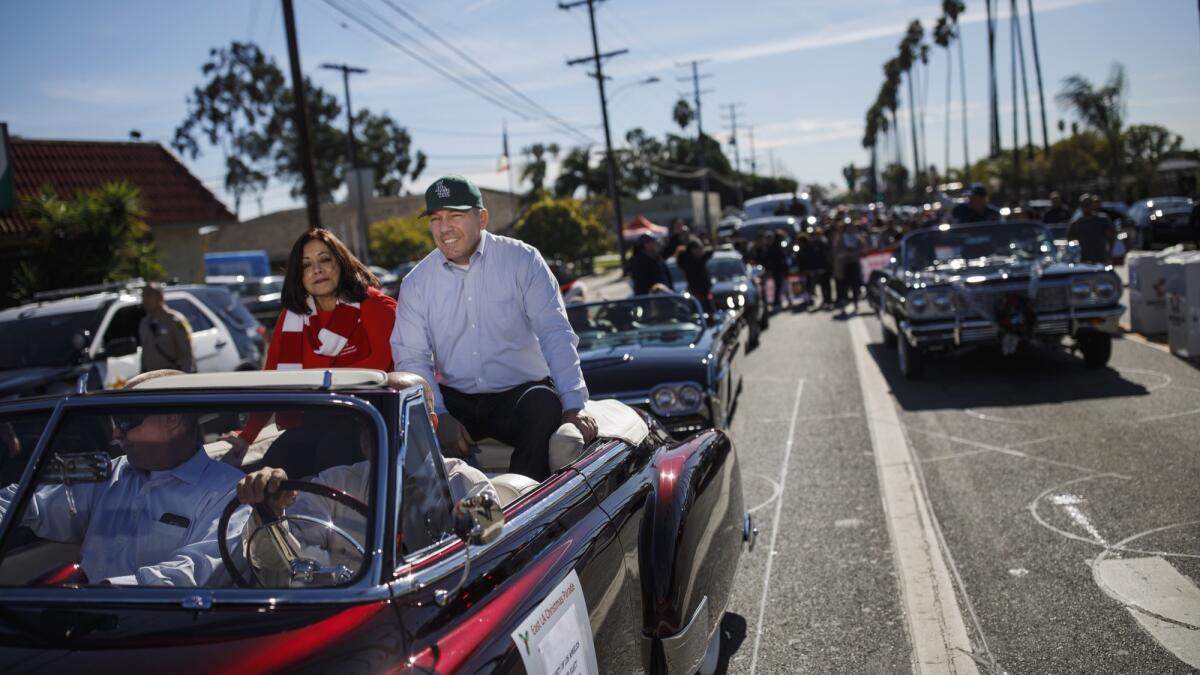Alex Villanueva, the county’s new top cop, has been quietly fighting for a political win for decades

- Share via
Alex Villanueva has long known the feeling of not fitting in.
He ran from bullies as a young boy in New York, before moving to Puerto Rico where he quickly had to learn Spanish. He would walk to school along sugar cane fields there, reading books the whole way.
For the record:
2:50 p.m. Dec. 5, 2018A previous version of this article said that Alex Villanueva was the target of a complaint about alleged improprieties in his campaign donations. In fact, the complaint pertains to a donor to his campaign and Villanueva is not the target, according to the Los Angeles County district attorney’s office.
As a deputy in the Los Angeles County Sheriff’s Department, he was ridiculed for writing a report accusing his bosses of discriminating against Latinos.
His outspokenness in an organization built on a strict hierarchy dominated his career and outsider status, with him retiring as a lieutenant earlier this year after being repeatedly denied promotion.
He lost several bids for public office but persisted in seeking out leadership roles.
Now Villanueva, 55, is taking on the kind of executive authority he long railed against, rising six ranks to become the county’s 33rd sheriff, supported in his long-shot campaign by the rank-and-file deputies’ union he once sought to dismantle.
“My career has been killed so many times over I’ve been like Freddy Krueger,” he said. “I keep rising from the dead. They think they got me, but I rise again.”
The first-time officeholder faces a steep challenge in assuming one of the most powerful jobs in all of law enforcement. Much will be new to the former lieutenant, who went from having supervised about 100 people to running an agency with a $3 billion budget, 16,000 employees and full-time legislative advocates in Sacramento and Washington, D.C.
His defeat of then-Sheriff Jim McDonnell, a veteran police leader, stunned the political establishment, prompting questions about whether Villanueva has the skill set to lead a department rattled by years of corruption scandals.
He took a bold, some say rash, step from the start, announcing in the week leading up to his swearing-in that he planned to remove 18 high-ranking department officials in a massive house cleaning. And he begins his tenure following a complaint about alleged improprieties in his campaign donations.
He now leads a department that is still reeling from a jail abuse scandal that took down former Sheriff Lee Baca and several of his top aides, and is facing questions over racial profiling and deputy tattoos.
“There will be a learning curve. But this is a man with a PhD. He is no dummy,” said Capt. Eli Vera about Villanueva, who earned the degree in public administration at the University of La Verne. The two worked together when they were sergeants at the Lennox Station in the early 2000s, and Vera consulted on Villanueva’s campaign.
Indeed, Villanueva has been quietly developing his political career for decades.
At 29, he ran for City Council in San Dimas, losing by just 44 votes. The next year, the young deputy announced his candidacy against former Sheriff Sherman Block in the 1994 election, saying, as he does today, that he would improve deputy morale. He eventually abandoned the campaign but kept mulling another run.
It was around this time that an undergrad at Cal State Los Angeles named Vivian Lopez was embedded with a Sheriff’s Department narcotics team during an internship. An undercover surveillance mission she attended was nearly botched when a deputy in thick bifocals showed up unannounced in a marked patrol car.
“He’s gonna ruin it for us!” she recalled thinking. “Well, three years later, I marry the guy.”
Vivian Villanueva served many years as a deputy, while helping to raise her husband’s son from a previous relationship.
“He has always been the underdog,” she said, adding that her husband deeply wants to help people and call out injustice.
His intense fixation and frankness have sometimes been off-putting in a department where social relationships are key, according to some who have worked with him.
“I even had people who would not want to be near me because they thought Alex was a black cloud,” Vivian said.
But his tenacity has also earned respect. His opposition to fracking in their La Habra Heights neighborhood attracted notice from an activist who urged him to run for City Council in 2014. He lost.
Greg Stefflre, who served on the La Habra Heights planning commission with Villanueva, said his colleague was passionate in denouncing plans to activate oil wells in the community.
“His posture at the podium was a bit pugnacious and as the significance of his comments grew he leaned forward and thrust his jaw out. Made quite an impression,” said Stefflre, who disagreed with Villanueva, but said he found him to be thoughtful and respectful.
Villanueva has always gravitated toward athletic events linked to the department, finding himself less keen on making drinking buddies with other deputies, said Vivian, who with her husband is a part owner of a CrossFit gym in Whittier. He tends to keep a small circle of friends, she said.
One of them, retired Capt. Matt Rodriguez, said that when the two worked together as drill instructors at the Sheriff’s Academy in the late 1990s, Villanueva — nicknamed “the scientist” — often spoke freely about his long-term goal: to become sheriff of Los Angeles County.
When their union, the Assn. for Los Angeles Deputy Sheriffs, endorsed Block’s 1998 reelection bid despite three-quarters of deputies advocating for someone new, Rodriguez said he and Villanueva went to the union’s leaders, questioning the decision and, eventually, the organization’s finances.
ALADS moved to suspend both men, who started a separate guild, the Los Angeles Sheriff’s Professional Assn., which still exists today. The two men also worked to get ALADS decertified, Rodriguez said.
This year, ALADS endorsed Villanueva and spent at least $1.32 million supporting him.
“As far as I’m concerned, Nov. 6 was poetic justice for Alex,” Rodriguez said.
Villanueva’s abrupt ouster of several top Sheriff’s Department officials, leaving no time for the old guard and new administration to overlap and share knowledge, has struck some observers as score-settling.
Villanueva promised during the campaign to rid the department of people who he said didn’t deserve their titles, often noting he had been unfairly blocked from advancement despite passing the lieutenant’s test four times.
He has acknowledged that he was suspended for five days and again for 10 days in the early 2000s for allegedly failing to timely report derogatory statements made by another employee. He denied the claims, calling them blowback for his assertions that the department discriminated against Latino deputies.
He said the discipline was erased from his record in a settlement he reached after suing the department. In 2012, Villanueva and the department were sued by a black custody assistant who said Villanueva referred to him as a “knuckle dragger,” which the jailer interpreted as a racial slur.
Villanueva has denied making the comment and said there was no finding of wrongdoing. The county settled with the custody assistant, Dwayne Perry, for $10,000. An attorney who represented him confirmed there was no misconduct finding but declined to comment further.
In his effort to rebuild the department, Villanueva named to his executive team retired Cmdr. Bob Olmsted, an early whistleblower about brutality in the jails. He was one of several officials who testified against Baca and former undersheriff Paul Tanaka, who were convicted in a sweeping jail abuse scandal several years ago.
Villanueva’s naming of department insiders to the highest executive positions has caused some to wonder whether the department would be better served by bright minds from the outside.
Michael Gennaco, who headed the Office of Independent Review, which monitored the Sheriff’s Department, for 13 years, said that while some personnel changes risk losing experience, “I always think an organization can benefit at the higher levels if people are from the outside, who did not grow up in the organization.”
Villanueva, who was born in Chicago to a Puerto Rican father and a Polish American mother, moved several times as a child, eventually landing at age 9 in Puerto Rico, where he spent his adolescence.
After serving a year in the U.S. Air Force, Villanueva joined the Air National Guard and the California Army National Guard before becoming a deputy with the Sheriff’s Department. Two years into the job, he said, he walked into a commander’s office with a proposal to ban smoking in the jails. The commander initially balked, Villanueva said, but the ban went into effect.
In 1997, when Villanueva was studying for his master’s degree in public administration at Cal State Northridge, his thesis offered a fierce critique of how the department handled promotions — the process, Villanueva argued, discriminated against Latino deputies.
By the mid-2000s, the issue had grown increasingly personal and Villanueva filed a racial discrimination lawsuit, after learning that an open sergeant position at the Lennox station he’d been told was unavailable had gone to a white man.
Villanueva conducted a diversity study and determined that Latino deputies were underrepresented. He took his findings to a commander who encouraged Villanueva to stop pushing “the brown thing,” according to the lawsuit. He eventually settled the matter.
During the run-up to the sheriff’s election, many observers weren’t convinced of Villanueva’s potential. Javier Gonzalez, the campaign strategist for Citizens PAC, a group that channeled funds from labor groups to promote Villanueva, said the candidate aimed his message too much at deputies, so much so that he sounded like he was running to be president of the deputies’ union.
But Gonzalez said he liked Villanueva’s “sort of nerdy, quirky, cute brilliance,” finding he had a thoughtful side and was more effective when he shared personal stories touching on broader issues such as community policing.
Gonzalez advised Villanueva on how to adapt his message to connect with a wider swath of voters.
Villanueva is taking over an agency that’s spent years shedding a reputation as a magnet for cowboy cops, where brutality against jail inmates was endemic and racial profiling so rampant that federal authorities had to intervene.
The department implemented significant reforms in recent years, but new concerns have emerged that deputies may be profiling Latino motorists and forming tattooed internal gangs. Several deputies have recently been arrested for serious crimes such as rape, robbery and drug trafficking.
And Villanueva is starting in his position under heightened scrutiny. The Los Angeles County district attorney’s office has said it is reviewing a complaint about potential straw donors to Villanueva’s campaign.
Straw donors are people who are publicly listed as giving money to a campaign but are actually being reimbursed by another person who is trying to conceal his or her name as the source of the money — an arrangement barred by state campaign finance laws.
Villanueva has said he believes all the donations to his campaign were legal and that he is not considering refunding them.
At his swearing-in ceremony Monday, Villanueva recounted how little money his campaign raised compared to McDonnell, and how he and his team were dismissed by the establishment. But he pulled through, he said, with the help of “a few brave souls.”
“I was not supposed to be here,” he said.
Twitter: @mayalau
Twitter: @marisagerber
More to Read
Sign up for Essential California
The most important California stories and recommendations in your inbox every morning.
You may occasionally receive promotional content from the Los Angeles Times.












